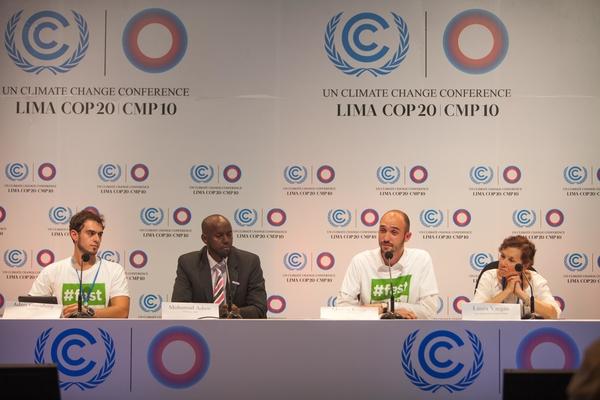Climate Change Negotiations at the Global Level: Warime Guti

Fast for the Climate at Cop 20 in Lima, Peru
By Warime Guti
For those who have no idea about what is going on with Climate Change negotiations at the global level, I will try to make my points as simply as possible, without any technical abbreviations or jargon. First, let’s define some of the basic terms:
Climate Change: What is it?
This question might seem too basic, because by now most of us already know at least something about what climate change is. In short, the earth is warming up at a much faster rate due to increased emission of carbon dioxide within the last century. The warmth has caused some significant changes to the earth’s climate and this has become a threat to human lives.
What are some effects of climate change?
Some example are: extreme weather events, severe droughts, severe floods, rising sea levels, and melting glaciers.
What is COP20?
Oh, wait! Let’s go over what UNFCCC is:
Let’s simply say that the UNFCCC (United Nations Framework Convention on Climate Change) is the UN’s response to climate change, where countries come together to negotiate and find ways to meet the challenges of climate change affecting the planet.
And now what is COP?
COP (Conference of Parties) is the decision-making body of the UNFCCC. All countries that are Parties to the UNFCCC are represented.
Why the 20 in COP20?
20 means it is the 20th time COP meeting took place. The COP has been meeting annually since 1995.
How sure are we that the earth is warming up?
Scientific evidence points to the fact that the world is indeed warming at an alarming rate compared to the same period in the last century. Data is provided by the UN scientific arm called the Intergovernmental Panel on Climate Change (IPCC).
One significant finding, greatly shaping the targets of these climate negotiations is that if the average global temperature rises 2 degree Celsius we will cause irreversible effects of climate change no matter what we try to do to prevent it.
Based upon this critical scientific evidence, the UN facilitates COP negotiations, encouraging commitments from governments to address climate change.
Why are these global negotiations so complicated?
At international negotiations it is not as simple as looking at scientific evidence, making decisions, and committing to change. It’s a very dynamic and complicated process.
First, each country has their respective national economic development priorities. At such international talks, countries tend to be very careful not to sacrifice their national priorities for international priorities and commitment. This is where the complexity of the negotiation begins.
For now, let’s just say, most activities that emit huge amounts of carbon are directly or indirectly linked to the economic development in any one country. For example, carbon emissions can come from manufacturing industries, extraction industries, transportation, agriculture, and home energy consumption.
These activities generate income, keep a country’s economy going, and create jobs. Many countries rely economically on oil/gas production or resource extraction industries and in turn these fossil fuels are used for other sectors.
Secondly, the economic statuses in all countries are not equal. At the negotiations, there are countries with
- strong economies
- emerging economies
- developing economies
Each country brings their respective expectations as well as the interests of the group of countries with which they share similar goals. They will push for their expectations throughout the negotiations and at the end either they get what they expected, or a compromise has to be made so an agreement can be reached with all the parties. Decision making at the UN is not based on a majority of votes but on consensus, meaning all parties have to agree in order for a decision to be reached.
Some countries with strong economies, particularly within Europe, are seen to be willing to negotiate and commit to strong measures in cutting down carbon emission. Meanwhile others with strong economies are less interested or not showing any interest at all, particularly some in Asia, North America, and Australia.
The emerging economies are reluctant to make strong commitments so they negotiate for limitations. Their priority is economic development which they perceive as a conflict to strong emission reduction commitments.
These two distinct groups of countries have been at the fore front of the debate in these climate talks so far.
It’s like a tug of war. A country or a group of countries proposes one commitment, but always with conditions. While they push for it, other countries or groups propose conflicting alternatives.
Why is this COP in Lima important? What is important at COP20 in Lima?
At prior COP meetings these complexities prevented the negotiating parties from coming to an agreement and meeting the expectations of civil society.
In 2009, the COP15 was held in Copenhagen, and many expected the parties to reach an agreement. However, the memory of Copenhagen looms large, because it failed to produce what civil society had expected. If serious commitments had been made at that time, we would have already been on the road to reduce emissions since 2009.
COP20 is significant because now most countries are expressing a willingness to commit, unlike in 2009. Even some huge players like China, USA and Australia, who have been quiet previously, have now come into play.
The significance of this COP20 in Lima this year is getting parties to agree on what next year’s agreement will include. Any concrete decisions or binding agreements would happen next year at COP21 in Paris, which will determine country commitments from 2020 onwards. COP20 basically is the preparation for COP21.
COP21 will be a critical COP in our planet’s history. Here’s how you can help personally, as a group, or as a Church.
- Stand in solidarity with those who have been effected by climate change
- Raise a strong voice expressing the urgency for immediate action on climate justice
- Reflect personally on our own actions. As fasting is part of our spiritual tradition, we can fast and pray together for climate justice.
- Remind ourselves of our own freedom and capacity to serve, and inspire others to join us.
We have launched 365 days of fasting in addition to the fasting first day of each month. Visit the website to learn more: www.lutheranworld.org/fastfortheclimate and also follow us on twitter at #LWFclimate





